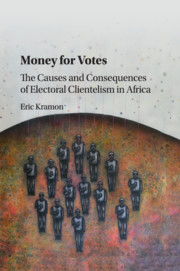Book contents
- Frontmatter
- Contents
- List of Tables
- List of Figures
- Acknowledgments
- Part I The Puzzle of Electoral Clientelism
- Part II Empirical Evidence
- Appendices
- A Survey List Experiment Details
- B Variables from the Afrobarometer Survey Data
- C Field Experiment Radio Recording Script
- D Description of Control Variables in the Field Experiment
- E The Sample and Balance in the Field Experiments
- F Supplementary Results for Chapter 5
- G Supplementary Results for Chapter 7
- Bibliography
- Index
B Variables from the Afrobarometer Survey Data
from Appendices
Published online by Cambridge University Press: 26 October 2017
- Frontmatter
- Contents
- List of Tables
- List of Figures
- Acknowledgments
- Part I The Puzzle of Electoral Clientelism
- Part II Empirical Evidence
- Appendices
- A Survey List Experiment Details
- B Variables from the Afrobarometer Survey Data
- C Field Experiment Radio Recording Script
- D Description of Control Variables in the Field Experiment
- E The Sample and Balance in the Field Experiments
- F Supplementary Results for Chapter 5
- G Supplementary Results for Chapter 7
- Bibliography
- Index
Summary
Chapter 4 relies in part on Afrobarometer survey data collected in Kenya. The Afrobarometer round 5 survey was conducted in Kenya in November 2011 and includes responses of 2,399 individuals. Each Afrobarometer survey is designed to be nationally representative. Survey questions probe attitudes and experiences related to political, economic, and social life.
In this appendix, I describe in further detail the survey questions and measures used in Chapter 4. Along with the respondent's report of whether they voted in the 2007 election as well as their age, gender, and residence in a rural location—each which fall straightforwardly from survey responses—I create the following variables.
Offered bribe or gift in 2007. To generate this measure, I used the survey question that asked: “And during the last national election in 2007, how often, if ever did a candidate or someone from a political party offer you something, like food or a gift or money, in return for your vote?” I created a dichotomous measure that takes a value of 1 if the respondent reports that this happened to them once or more, and 0 otherwise: 32 percent of the sample report receiving a bribe or gift in 2007.
Ballot not secret. To generate the measure of perceptions of ballot secrecy, I used the survey question that asked: “How likely do you think it is that powerful people can find out how you voted, even though there is supposed to be a secret ballot in this country?” Responses could range from Not at all likely (0), Not very likely (1), Somewhat likely (2), and Very likely (3)—82 percent of the sample reports Not at all likely.
Freedom to vote without pressure. To generate the measure of how free or autonomous respondents feel with respect to their voting decisions, I used the question that asked: “In this country, how free are you to choose who to vote for without feeling pressured?” Responses range from Not at all free (1), Not very free (2), Somewhat free (3), and Completely free (4)—78 percent responded that they are completely free.
Feels close to a political party. To determine whether the respondent has a partisan identity, I used the survey question that asked: “Do you feel close to any particular political party?” Responses are either yes or no—57 percent report that they feel close to a particular party.
Information
- Type
- Chapter
- Information
- Money for VotesThe Causes and Consequences of Electoral Clientelism in Africa, pp. 195 - 196Publisher: Cambridge University PressPrint publication year: 2017
